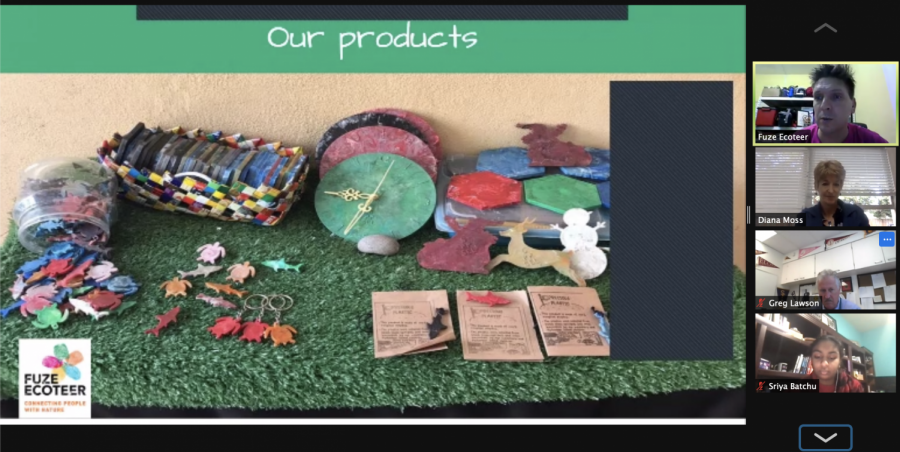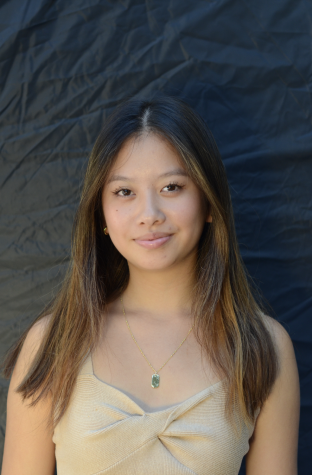Green Team hosts Daniel Quilter, whose project upcycles used plastic into new products
The Green Team invited Daniel Quilter to speak about his plastic upcycling project in Malaysia on April 26. Quilter’s project uses the Precious Plastic machine, which can convert used plastic into upcycled objects like coasters, clocks, utensils, and more.
May 4, 2021
The Green Team invited Daniel Quilter to speak about his plastic upcycling project in Malaysia on April 26. As part of the club’s Earth day activities, Quilter explained the effects of plastic on our planet and how his work can minimize the harm of excessive waste to upper school students and faculty members.
Quilter’s project uses the Precious Plastic machine, which can convert used plastic into upcycled objects like coasters, clocks, utensils, and more. After moving to Malaysia in 2005, he realized how much waste littered the streets.
“But over here, [plastic is] all over the streets, when you walk down the streets. I’ve been chased by plastic as soon as I landed in Malaysia in 2005,” Quilter said. “It was plastic everywhere, and from there, I really wanted to do stuff about plastic and recycling.”
At the start of the pandemic early last year, Quilter and his team began to regularly use the Precious Plastic machine, a recently developed technology that can convert waste into new products. First, the plastic is shredded into small pieces, and then it is melted and injected into specially designed molds. Currently, Quilter can only use the injection mold to make small objects, as he is limited by the volume of plastic available to him, but he hopes to expand in the future and create products like chairs or stools.
“The things we can do, at the moment, we can only make small things, but if we increase the volume of the plastic, we can make bigger things. We want to upgrade as we grow and have the money to buy the molds,” he said.
Although it may seem like plastic itself is the real problem, Quilter explained that it is not. Instead, the way that our waste is managed causes much more damage to our environment. Living in the United States, we often do not see where our trash goes: most times, unfortunately, it ends up in the earth’s oceans and rivers, and the plastic is not recycled properly.
“Plastic is actually designed to be recycled, that’s what we focus on: campaigning for kinds of plastic that can be recycled. The main thing is just to manage your waste and to investigate and learn what happens to your waste. I’ve spoken to a lot of students so far, and none of them know what happens to the waste,” Quilter said. “It’s also campaigning for things like Coca Cola and these brands, they’re the ones who have the money, they’re the ones who should be researching and making products that are truly biodegradable.”
Namrata Karra (10), who attended Quilter’s speaker event, enjoyed the presentation because of how interactive it was. Quilter asked the attendees if they had any ideas about what new products he should make with his machine.
“It was really eye opening to see how much damage plastic does all over the world and how it’s affecting the people who aren’t creating the damage. It’s more big corporations who use a lot of plastic and it ends up in the ocean, and these people have to pay for it by cleaning up,” Namrata said. “So I learned that it’s everywhere, and we all have to do our part in making it get better.”


















![“[Building nerf blasters] became this outlet of creativity for me that hasn't been matched by anything else. The process [of] making a build complete to your desire is such a painstakingly difficult process, but I've had to learn from [the skills needed from] soldering to proper painting. There's so many different options for everything, if you think about it, it exists. The best part is [that] if it doesn't exist, you can build it yourself," Ishaan Parate said.](https://harkeraquila.com/wp-content/uploads/2022/08/DSC_8149-900x604.jpg)




![“When I came into high school, I was ready to be a follower. But DECA was a game changer for me. It helped me overcome my fear of public speaking, and it's played such a major role in who I've become today. To be able to successfully lead a chapter of 150 students, an officer team and be one of the upperclassmen I once really admired is something I'm [really] proud of,” Anvitha Tummala ('21) said.](https://harkeraquila.com/wp-content/uploads/2021/07/Screen-Shot-2021-07-25-at-9.50.05-AM-900x594.png)







![“I think getting up in the morning and having a sense of purpose [is exciting]. I think without a certain amount of drive, life is kind of obsolete and mundane, and I think having that every single day is what makes each day unique and kind of makes life exciting,” Neymika Jain (12) said.](https://harkeraquila.com/wp-content/uploads/2017/06/Screen-Shot-2017-06-03-at-4.54.16-PM.png)








![“My slogan is ‘slow feet, don’t eat, and I’m hungry.’ You need to run fast to get where you are–you aren't going to get those championships if you aren't fast,” Angel Cervantes (12) said. “I want to do well in school on my tests and in track and win championships for my team. I live by that, [and] I can do that anywhere: in the classroom or on the field.”](https://harkeraquila.com/wp-content/uploads/2018/06/DSC5146-900x601.jpg)
![“[Volleyball has] taught me how to fall correctly, and another thing it taught is that you don’t have to be the best at something to be good at it. If you just hit the ball in a smart way, then it still scores points and you’re good at it. You could be a background player and still make a much bigger impact on the team than you would think,” Anya Gert (’20) said.](https://harkeraquila.com/wp-content/uploads/2020/06/AnnaGert_JinTuan_HoHPhotoEdited-600x900.jpeg)

![“I'm not nearly there yet, but [my confidence has] definitely been getting better since I was pretty shy and timid coming into Harker my freshman year. I know that there's a lot of people that are really confident in what they do, and I really admire them. Everyone's so driven and that has really pushed me to kind of try to find my own place in high school and be more confident,” Alyssa Huang (’20) said.](https://harkeraquila.com/wp-content/uploads/2020/06/AlyssaHuang_EmilyChen_HoHPhoto-900x749.jpeg)











